Maintenance Cognitive Stimulation Therapy (MCST)
MCST supports the wellbeing and mental stimulation of people living with dementia through group activities.
What's MCST?
Maintenance Cognitive Stimulation Therapy (MCST) is a weekly one- to two-hour-long programme for people living with mild to moderate dementia.
Group members take part in meaningful and stimulating activities, proven to help maintain memory and mental functioning. The groups provide a fun, supportive environment where people can build new friendships.
Activities include:
- discussions
- word games
- quizzes
- physical activities
- creative and musical activities.
Watch our MCST videos
Watch the videos below to find out more about the impact that MCST has on people living with dementia, as well as their carers and loved ones.
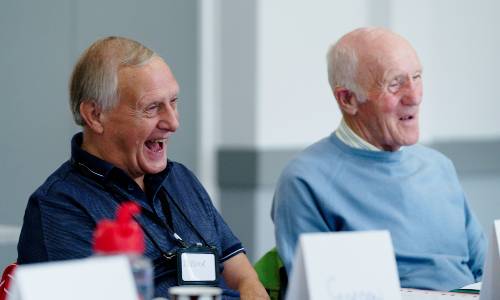
Age UK Berkshire
Supporting people living with dementia by providing MCST sessions, as well as a supportive space for carers.
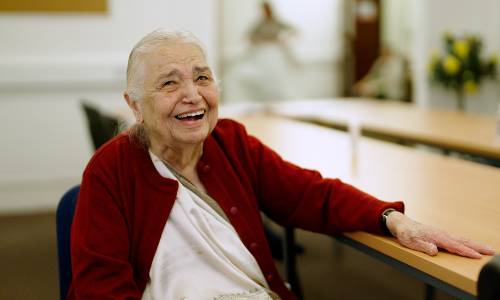
Age UK Tameside
Supporting people in the Gujarati community living with dementia by facilitating translated MCST sessions.
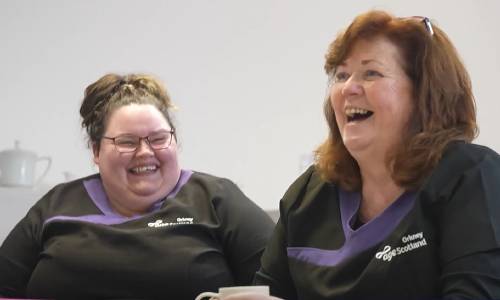
Age Scotland Orkney
Supporting people living with dementia in their communities by facilitating online MCST sessions.
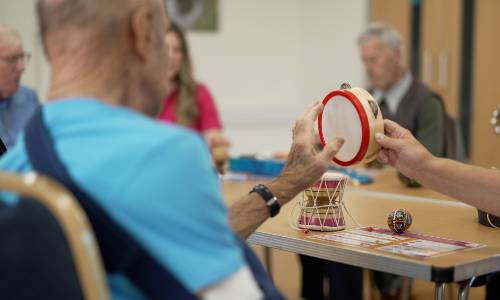
Age UK Somerset
Supporting people living with dementia in the Taunton area by providing MCST sessions since 2021.
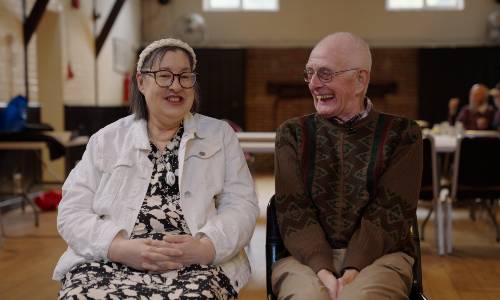
Age UK Hertfordshire
Supporting people living with dementia in their communities by delivering MCST sessions.
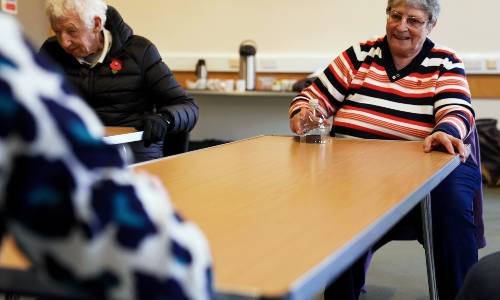
Age UK Somerset
Supporting people living with dementia in Bridgwater and across Somerset by providing MCST sessions.
Why is MCST so important?
After someone is diagnosed with dementia, they may be offered Cognitive Stimulation Therapy (CST). This is a short-term programme for people with mild to moderate dementia and usually runs twice weekly for seven weeks following diagnosis.
However once this programme finishes, there’s limited provision of services for people with mild to moderate dementia. MCST is a longer-term programme based in community settings which helps to fill this gap.
Cognitive Stimulation is the only non-drug treatment recommended to improve cognition, independence and well-being by the National Institute for Health and Care Excellence (NICE).
Some things, like crosswords, can be difficult to tackle on your own but together you feel you can do it.
Where can I find an MCST group?
With thanks to generous funding from the Association of British Insurers' COVID-19 Support Fund, MCST programmes have been delivered across the Age UK, Scotland and Cymru network – including some established virtual MCST groups.
Many local partners are still delivering MCST. Contact your local Age UK to find out if they're running sessions.
The Association of British Insurers' funding ran from January 2021-December 2023. Below is a list of all the local partners who took part in that period.
Local partners delivering MCST January 2021-December 2023
Phase 1
- Age Cymru Dyfed
- Age UK Berkshire
- Age UK Birmingham
- Age UK Calderdale and Kirklees
- Age UK County Durham
- Age UK Coventry & Warwickshire
- Age UK Doncaster
- Age UK East London
- Age UK Enfield
- Age UK Gateshead
- Age UK Hythe and Lyminge
- Age UK Lancashire
- Age UK Lincoln & South Lincolnshire
- Age UK Medway
- Age UK Milton Keynes
- Age UK North, South and West Dorset
- Age UK North Yorkshire & Darlington
- Age UK Northumberland
- Age UK Plymouth
- Age UK Salford
- Age UK Somerset
- Age UK South Gloucestershire
- Age UK Sunderland
- Age UK Tameside
- Age UK West Sussex, Brighton and Hove
- Age UK Worcester & Malvern Hills
Phase 2
- Age NI
- Age Scotland Orkney
- Age UK Barnsley
- Age UK Bexley
- Age UK Bournemouth, Poole & East Dorset
- Age UK Bristol
- Age UK Cheshire East
- Age UK Devon
- Age UK Faversham and Sittingbourne
- Age UK Herefordshire and Worcestershire
- Age UK Hertfordshire
- Age UK Kensington and Chelsea
- Age UK Leeds
- Age UK Leicester Shire & Rutland
- Age UK Norwich
- Age UK Portsmouth
- Age UK Reading
- Age UK Scarborough and District
- Age UK Sheffield
- Age UK South Kent Coast
- Age UK Surrey
- Age UK Teesside
- Age UK Wakefield District
- Age UK Westminster
Phase 3
- Age Cymru Dyfed
- Age UK Ashford
- Age UK Barrow
- Age UK Bedfordshire
- Age UK Berkshire
- Age UK Blackburn with Darwen
- Age UK Camden
- Age UK Carlisle and Eden
- Age UK Cheshire
- Age UK County Durham
- Age UK Coventry and Warwickshire
- Age UK Gateshead
- Age UK Lambeth
- Age UK Lancashire
- Age UK Milton Keynes
- Age UK North Tyneside
- Age UK Northumberland
- Age UK Sheppey
- Age UK Somerset
- Age UK Tameside
- Age UK Trafford
- Age UK Wandsworth
- Age UK Wirral
What's the impact of MCST?
Age UK's MCST programme was found to have improved or slowed the decline of the cognitive abilities of people living with mild to moderate dementia. It also improved their overall wellbeing.
Over the course of the programme, MCST was found to have a positive impact on clients' lives in a range of ways:
- The QUAL-AD score for clients increased, suggesting an improved quality of life.
- Clients' cognition levels largely remained level over the course of the programme.
- Clients, carers and staff saw a range of improvements in clients' cognition and a range of other behaviours.
MCST programme evaluation report
The evaluation report for the 2021-2023 Age UK Dementia MCST programme was done by Research Works Ltd.
Pilot programme evaluation report
This report evaluates the MCST pilot programme which ran from 2017-2018. It aimed to provide more services across the country.
I can see the difference in him from when I drop him off to when I pick him up again – he’s so much happier and chatty.
For more information, contact dementiamcst@ageuk.org.uk
 We're here to help
We're here to help
We offer support through our free advice line on 0800 678 1602. Lines are open 8am-7pm, 365 days a year. We also have specialist advisers at over 120 local Age UKs.
